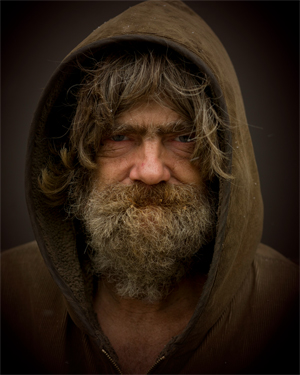
In the Gospel reading this past Sunday—the Third Sunday of Advent—we heard the following words from the mouth of John the Baptist.
The crowds asked John the Baptist, “What should we do?” He said to them in reply, “Whoever has two cloaks should share with the person who has none. And whoever has food should do likewise.”
These words rang true for me that day, a definite challenge to me. It reminded me of St. Francis of Assisi and the disgust he felt towards the lepers. He would look at them and feel sick to his stomach. If he saw one coming near him he would walk the other way. But then something happened in Francis. He felt that same kind of gut-wrenching call of the Spirit. So he prayed. And believe you me, Francis could pray. His conversations with God would last hours. And on this particular occasion he made an oath to God that he would embrace the next leper that crossed his path.
He regretted it at first. No sooner had he finished the prayer than he found himself in the path of a leper. He felt that disgust and disdain. He thought about turning his back and walking the other way. But he remembered his oath and God’s promise: “What was once bitter will now be sweet.”
A Life-Changing Encounter
So he put his feelings aside and approached the leper and embraced him. He kissed him. He walked with him for a while, talking with him. After his encounter he realized that he felt something different. God had taken Francis’ world and turned it upside down. He no longer reviled the lepers. He loved them. He spent hours with them each day and they became his closest friends.
Now I really felt challenged. Despite the obvious Christian duty of love of neighbor, I too had rather negative feelings towards the homeless. In the past I would refrain from giving them money not knowing whether it would be used for food or not. There was an air of superiority in me. Pride. Something I’ve struggled with since the early days of my conversion. But God has brought me to my knees many times to rid me of it—and continues to do so.
I went in an purchased what I needed and left as normal. On my way home I felt moved yet again and this time I took action. I returned a few minutes later with a warm meal for the man, who I approached with a warm smile. Instead of just giving him the food, turning, and walking away, I stayed for a while. I remembered how Francis would give not just of his money, but of himself. He would converse with the lepers and the beggars, learning their names and asking about their lives. He treated them like humans, as brothers. So I learned his name. I remembered the words of Albert, one of the closest of Francis’ beloved beggars.
“I prefer a smile instead of food, and affection instead of alms. When people give, the majority do it with repugnance, with disdain, reluctantly, extending the arm and looking away…”
A Unexpected Lesson in Love
Then he pointed to a blanket with the Nativity scene on it covering his handful of belongings and said, “That’s what Christmas is really about.” “Amen!” I responded. I extended my hand to shake his. Then the unexpected, an embrace. As we stood outside in the cold, together in a warm embrace, he began to pray. He thanked God and gave praise to Jesus Christ. He prayed for all the good people that have taken care of him during his 24 years living on the streets. He prayed that people would understand that he does not wish to bother anyone.
I was more than moved. This experience has profoundly marked my soul. Like Francis it has changed my perspective. It has changed my heart. Who am I to judge the lifestyle of this man? Yes, of course I desire the best for him, most importantly that he have peace and love. He has decided to live free of material possessions and all that burdens our lives to obtain and sustain them. “When one has nothing, God becomes everything.”
Funny how as Christians we seek to bring Jesus to the poor—whether to evangelize or to fulfill our obligation and duty of fraternal love—and more often than not it is they who bring Jesus to us. I was reminded of Jesus’ promises of happiness, the Beatitudes, and also of his words:
“Amen, I say to you, whatever you did for one of these least brothers of mine, you did for me.”
How can you challenge yourself to better love the unlovable? Who do you feel called to reach out to? How clearly do you reflect the love of Christ unto others in your life?
All of the quotes and anecdotes of the life of St. Francis are taken from “Brother Francis of Assisi” by Fr. Ignacio Larrañaga which is available from Médiaspaul or free online at Google Books.